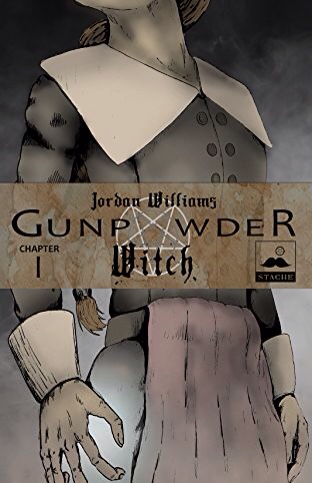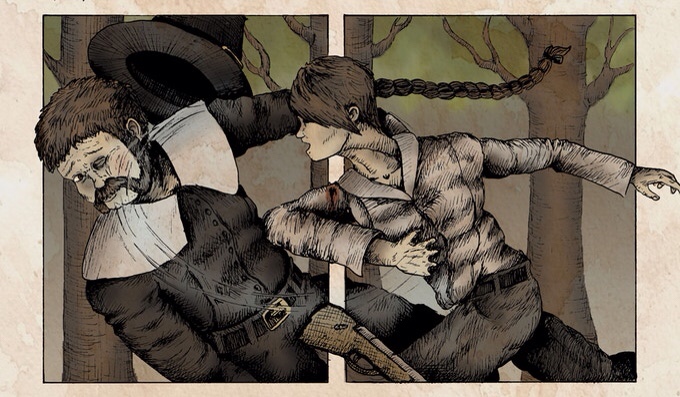
Gunpowder Witch
Writer: Jordan Williams
Artist: Jordan Williams
Publisher: Stache Publishing
Review by Brooke Ali

Gunpowder Witch tells the story of Rebecca Bell, a powerful, young woman living in 17th-century New England. Born with special powers, she has to hide her abilities from the townsfolk, especially the fanatically religious Reverend Mather. When her secret is discovered, she is accused of being a witch and her life is suddenly in danger.
I’ve always been interested in the history of the Salem witch trials; I even traveled to Salem, Massachusetts on a road trip, and I love to see different takes on the history. Williams’s choice to make the people accused of witchcraft have actual powers is an interesting one. Much of what makes the story of the witch trials so powerful is that the people accused weren’t actual witches; they were not only being accused of a crime they didn’t commit, but a crime that didn’t exist and the bare injustice of that has a lot to do with why it’s still in the public consciousness today.
Williams changes the tone considerably from a story about superstition and misogyny to one about intolerance; the “witches” in his comic are guilty of what they are being accused of: having powers. In fact, the two main characters, Rebecca and Corey, have powers that are very destructive. If you lived in a world where even harnessing electricity was several hundred years into the future, how would you react to a person who could shoot lasers out of their palms and sever people’s limbs off?

The theme of intolerance is the main message Williams is going for in Gunpowder Witch. These characters are being persecuted for being born different and nowhere is this shown better than in the fate of Rebecca’s friend Abigail, whose powers really were benign and not a threat to the village. But then Rebecca and Corey swear revenge on the village, which tempers some of my sympathy for them; they’re proving themselves to be the very threat that the villagers fear them to be. Williams says in the author profile that he’d wanted to imagine superheroes in a different historical context, and I guess this is just what superheroes do: fight the bad guys.
Rebecca seemed to have no problem immediately using her powers to maim people she had known all her life. The villagers equally have no problem with murdering their own neighbours; Abigail doesn’t even make it to the stake, and even people without powers are murdered. The good/evil dichotomy is very black and white here when there was room for a lot more nuance; between Reverend Mathers with the villagers and Rebecca, both sides feel they are completely justified in their use of violence. If the theme of intolerance is meant to reflect the current issues in our time, it is important for us to remember this.
I also wish, and this may just be me the historian being picky, that more effort had been made to use period dialogue. I don’t mean he had to be as historically accurate as Robert Eggers’ movie The Witch, and Williams did make some effort, especially in the early chapters (“Is it not marvelous!”), but hearing the 17th century characters use almost entirely modern dialogue kept me from feeling really immersed in the world. However, there was clearly solid research done into the clothing and architecture of the day.

The art style, which combines hatching with watercolour, creates a wonderful atmosphere for the story: rustic and a bit sepia-toned with liberal use of brown shades. The drawing still has some room to grow, however. Some panels are really striking and beautiful, while others show issues with perspective or look like not-quite-finished sketches. There’s clearly talent and potential here, and, as a first comic, this is a promising start.
Verdict: Wait and See.
Gunpowder Witch is Williams’s first graphic novel: written, drawn, and published by himself over a period of five years. Clearly this is a labour of love and it has a lot of potential, with room to grow in art and storytelling skills. If you’re looking for an exciting comic where the bad guys are all bad, the good guys are justified in their actions, and the main baddy gets his in the end, then support this project’s Kickstarter, which will run through the month of February.



